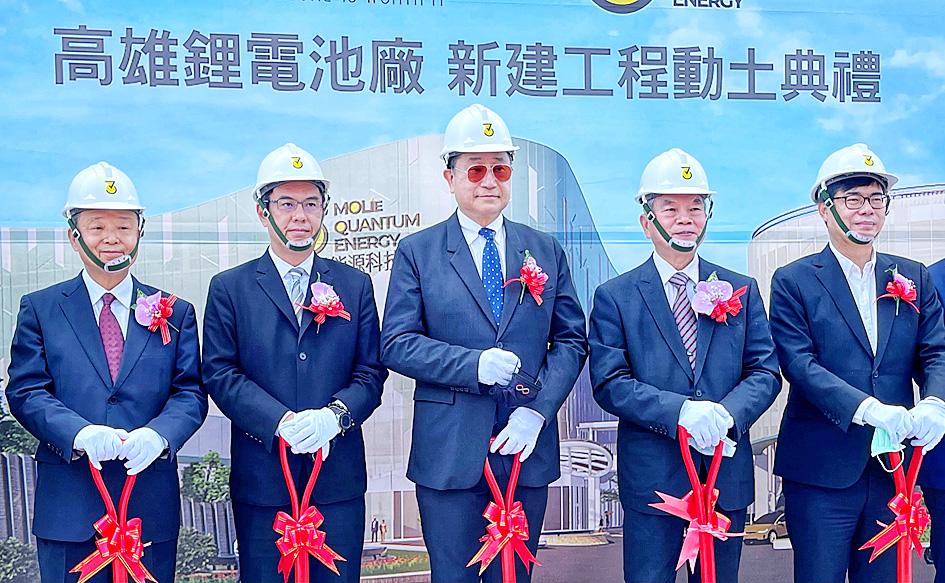A Taiwan Cement Corp (TCC, 台灣水泥) subsidiary yesterday broke ground for an advanced lithium battery plant in Kaohsiung’s Siaogang District (小港) at the former site of the cement maker’s paper mill.
Molie Quantum Energy Corp (三元能源科技) has planned to initially invest NT$12 billion (US$430.5 million) in the facility, which is to begin operations in 2023.
The facility is to have enough annual output to supply the long-range batteries needed for 24,000 electric vehicles — or 1.8 gigawatt-hours (GWh) of battery capacity.

Photo: Amy Yang, Taipei Times
It would use nickel, cobalt and manganese to make “ternary” batteries, and use lithium to make the anode material of the batteries, the company said.
The move is a step toward making Taiwan Cement green, company chairman Nelson Chang (張安平) told a groundbreaking ceremony.
The ceremony was attended by Vice Premier Shen Jong-chin (沈榮津), Kaohsiung Chen Chi-mai (陳其邁) and CTCI Group (中鼎集團) chairman John Yu (余俊彥), among other guests.
“We will make our batteries for the electric vehicle market, targeting the high-end, customized segment of that market,” Chang said.
The investment would help the nation’s battery ecosystem reach an economy of scale, while generating a large number of jobs in southern Taiwan, Chang added.
With the battery capacity of the new plant and the existing capacity at E-One Moli Energy Corp (能元科技), the group’s Tainan-based battery subsidiary, Taiwan Cement would have a total annual battery capacity of up to 3.2GWh.
E-One Moli is to hire more than 100 engineers and personnel for a research and development facility at the Southern Taiwan Science Park (南部科學園區), Taiwan Cement said, adding that Molie Quantum would focus on developing and perfecting production processes.
This is the group’s latest step in setting itself up as an energy firm, after it purchased Italian energy storage company NHOA SA earlier in the year, Chang said.
The shift also shows that the group is working toward decarbonization and investing in green energy, he added.
“Taiwan Cement has been decarbonizing by using alternative fuels and ingredients to make cement,” Chang said.
“It’s true that the existing process for making cement is carbon-intensive, but cement is also the irreplaceable adhesive of human civilization, without which there is no basic infrastructure,” he added.
The company has pledged to reduce carbon emissions by 30 percent by 2030, and to reach net-zero in its production of ready-mixed concrete by 2050.

Leading Taiwanese bicycle brands Giant Manufacturing Co (巨大機械) and Merida Industry Co (美利達工業) on Sunday said that they have adopted measures to mitigate the impact of the tariff policies of US President Donald Trump’s administration. The US announced at the beginning of this month that it would impose a 20 percent tariff on imported goods made in Taiwan, effective on Thursday last week. The tariff would be added to other pre-existing most-favored-nation duties and industry-specific trade remedy levy, which would bring the overall tariff on Taiwan-made bicycles to between 25.5 percent and 31 percent. However, Giant did not seem too perturbed by the

Foxconn Technology Co (鴻準精密), a metal casing supplier owned by Hon Hai Precision Industry Co (鴻海精密), yesterday announced plans to invest US$1 billion in the US over the next decade as part of its business transformation strategy. The Apple Inc supplier said in a statement that its board approved the investment on Thursday, as part of a transformation strategy focused on precision mold development, smart manufacturing, robotics and advanced automation. The strategy would have a strong emphasis on artificial intelligence (AI), the company added. The company said it aims to build a flexible, intelligent production ecosystem to boost competitiveness and sustainability. Foxconn

TARIFF CONCERNS: Semiconductor suppliers are tempering expectations for the traditionally strong third quarter, citing US tariff uncertainty and a stronger NT dollar Several Taiwanese semiconductor suppliers are taking a cautious view of the third quarter — typically a peak season for the industry — citing uncertainty over US tariffs and the stronger New Taiwan dollar. Smartphone chip designer MediaTek Inc (聯發科技) said that customers accelerated orders in the first half of the year to avoid potential tariffs threatened by US President Donald Trump’s administration. As a result, it anticipates weaker-than-usual peak-season demand in the third quarter. The US tariff plan, announced on April 2, initially proposed a 32 percent duty on Taiwanese goods. Its implementation was postponed by 90 days to July 9, then

AI SERVER DEMAND: ‘Overall industry demand continues to outpace supply and we are expanding capacity to meet it,’ the company’s chief executive officer said Hon Hai Precision Industry Co (鴻海精密) yesterday reported that net profit last quarter rose 27 percent from the same quarter last year on the back of demand for cloud services and high-performance computing products. Net profit surged to NT$44.36 billion (US$1.48 billion) from NT$35.04 billion a year earlier. On a quarterly basis, net profit grew 5 percent from NT$42.1 billion. Earnings per share expanded to NT$3.19 from NT$2.53 a year earlier and NT$3.03 in the first quarter. However, a sharp appreciation of the New Taiwan dollar since early May has weighed on the company’s performance, Hon Hai chief financial officer David Huang (黃德才)